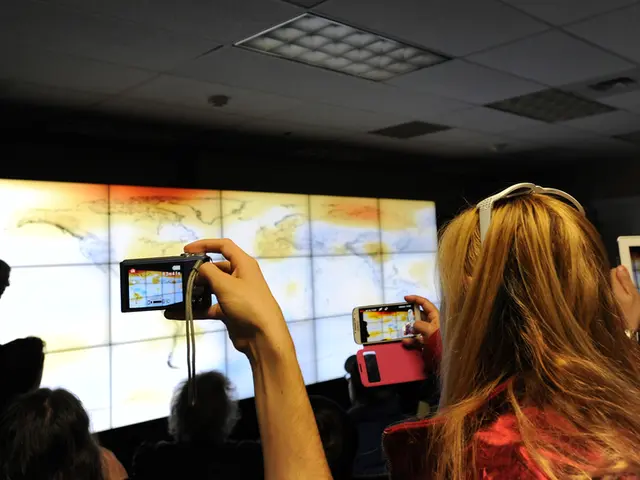Mobile Devices in Schools: Teachers Seek Guidance Amidst Privacy Conundrums
- *
Educators Seek Legal Protections Regarding Cell Phone Policies - Educators Seek Clear Legal Grounds Concerning Mobile Phone Usage
In the schoolyard, when a student boasts about having adult content on their device during breaks, what should a teacher do when faced with such a situation? This question has left many scratching their heads, as evidenced during an expert hearing within the education committee of Schwerin's state parliament.
Teachers find themselves in a murky area when it comes to pursuing such allegations and wanting to inspect a student's personal device, several experts noted.
Many teachers seek legal protection from the state to act proportionately, all while safeguarding the privacy rights of their students. This sentiment was echoed by Heike Walter, chairwoman of the school management association of Mecklenburg-Vorpommern. She also suggested that legal guidelines to enforce regulations, even towards parents, would aid teachers.
Much like traffic regulations disallow the use of phones while driving, regulations applicable to students could provide teachers a framework, as suggested by Professor Rainer Riedel, a neurologist, and psychotherapist. This clarity would enable teachers to take appropriate action.
Be it control or discretion – schools prefer the freedom to decide
With regards to decisions on using personal digital devices like smartphones or smartwatches in school, schools wish to maintain significant autonomy with regard to any binding regulations issued by the Ministry of Education. Numerous schools have already established rules through the school conference, in consultation with students and young people.
Many elementary schools demand smartphones be switched off for the entire school day or handed in upon arrival. As students grow older, they're offered more freedom. The principal of Neustrelitz's Sandberg elementary school, Betty Hirschfeld, is of the opinion that a ban on personal smartphones in school should extend until grade nine. On the flip side, Dr. Rainer Riedel advocates for "handy-free zones."
From the perspective of the chairman of the state student council, Felix Wizowsky, an outright ban on smartphones in school would be misguided. If all parties agree to hand over their devices before class, this is acceptable. However, "bans don't work, they only lead to a game of cat-and-mouse between students and teachers," Wizowsky stated.
Smartphones pose both risks and opportunities. Wizowsky believes the phone should occupy minimal space in schools, especially for students up to grade six.
However, smart devices could potentially be integrated creatively in education. "For instance, teachers could use students' devices to compose a German dictation," Wizowsky suggested.
In light of this, Education Minister Simone Oldenburg (Left Party) has made a commitment to create a guide for schools on how teachers can legally handle mobile phones. "We are happy to adopt this suggestion from the expert hearing in the Education Committee," the Minister stated a few hours later.
This guide will offer advice on legal actions regarding mobile phones, as well as recommendations for feasible and suitable regulations applicable to diverse school types. The Minister expressed reservations about an all-out ban on personal mobile devices, tablets, or smartwatches. "It's more sensible to consider the age, extent, and manner of device usage and develop school-specific regulations," the Minister concluded, echoing the practices already adopted by many schools.
- Personal Device
- Teacher
- ** Smartphone**
- Privacy Concerns
- Schwerin
- Education
- Mecklenburg-Western Pomerania
- Flensburg
- In the event of a student disclosing adult content on their device during school hours, the teacher may face a privacy conundrum due to the student's privacy rights, as characterized by Heike Walter, chairwoman of the school management association of Mecklenburg-Vorpommern.
- Schools in Pomerania, such as Neustrelitz's Sandberg elementary school, have been implementing policies regarding the use of smartphones, with some schools advocating for a ban until grade nine, as suggested by the school's principal, Betty Hirschfeld.
- The Education Minister of Schwerin, Simone Oldenburg, has committed to creating a guide to help teachers address legal issues related to the handling of mobile phones in schools, addressing privacy concerns and providing feasible regulations for diverse school types.
- The chairman of the state student council, Felix Wizowsky, suggests that rather than imposing blanket bans on smartphones, schools should focus on creating school-specific regulations considering the age, extent, and manner of device usage to maximize the educational potential of these devices and minimize privacy concerns.







